初二英语个辅讲义
- 格式:doc
- 大小:57.50 KB
- 文档页数:8
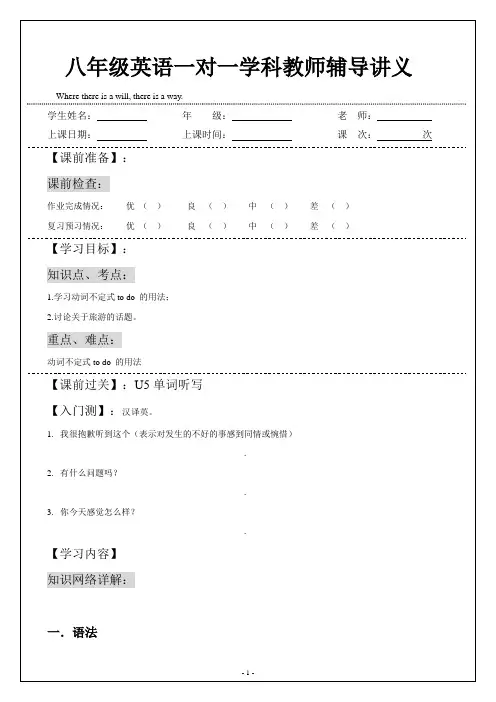
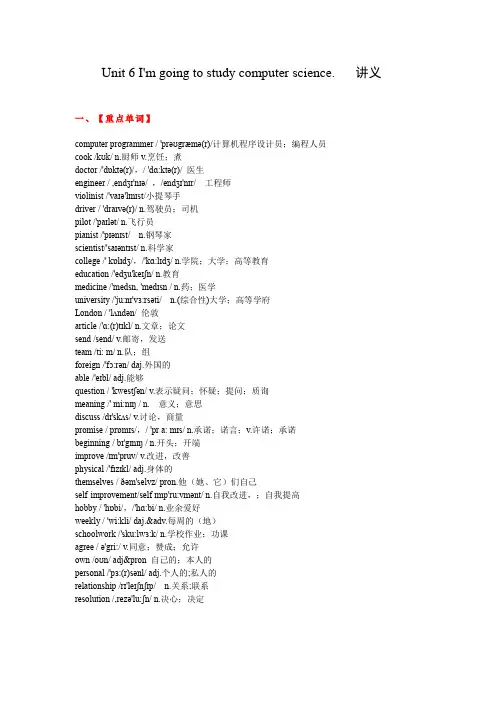
Unit 6 I'm going to study computer science. 讲义一、【重点单词】computer programmer / 'prəʊgræmə(r)/计算机程序设计员;编程人员cook /kʊk/ n.厨师v.烹饪;煮doctor /'dɒktə(r)/,/ 'dɑ:ktə(r)/ 医生engineer / ,endʒɪ'nɪə/ ,/endʒɪ'nɪr/ 工程师violinist /'vaɪə'lɪnɪst/小提琴手driver / 'draɪvə(r)/ n.驾驶员;司机pilot /'paɪlət/ n.飞行员pianist /'pɪənɪst/ n.钢琴家scientist/'saɪəntɪst/ n.科学家college /' kɒlɪdʒ/,/'kɑ:lɪdʒ/ n.学院;大学;高等教育education /'edʒu'keɪʃn/ n.教育medicine /'medsn, 'medɪsn / n.药;医学university /'ju:nɪ'vɜ:rsəti/ n.(综合性)大学;高等学府London / 'lʌndən/ 伦敦article /'ɑ:(r)tɪkl/ n.文章;论文send /send/ v.邮寄,发送team /ti: m/ n.队;组foreign /'fɔ:rən/ daj.外国的able /'eɪbl/ adj.能够question / 'kwestʃən/ v.表示疑问;怀疑;提问;质询meaning /' mi:nɪŋ / n. 意义;意思discuss /dɪ'skʌs/ v.讨论,商量promise / prɒmɪs/,/ 'pr a: mɪs/ n.承诺;诺言;v.许诺;承诺beginning / bɪ'gɪnɪŋ / n.开头;开端improve /ɪm'pruv/ v.改进,改善physical /'fɪzɪkl/ adj.身体的themselves / ðəm'selvz/ pron.他(她、它)们自己self-improvement/self ɪmp'ru:vmənt/ n.自我改进,;自我提高hobby / 'hɒbi/,/'hɑ:bi/ n.业余爱好weekly / 'wi:kli/ daj.&adv.每周的(地)schoolwork /'sku:lwɜ:k/ n.学校作业;功课agree / ə'gri:/ v.同意;赞成;允许own /oʊn/ adj&pron 自己的;本人的personal /'pɜ:(r)sənl/ adj.个人的;私人的relationship /rɪ'leɪʃnʃɪp/ n.关系;联系resolution /,rezə'lu:ʃn/ n.决心;决定二、【重点短语】1. computer programmer电脑程序员2. basketball player篮球运动员3. take acting lessons上表演课4. want to be...想成为……5. grow up长大6. be sure about对……有把握7.keep on doing sth继续/反复做某事8.make sure确保9.try one’s best to do sth尽某人最大的努力做某事10.every day每天11.practice doing sth练习做某事12. be able to do sth能够做某事13. make promises做承诺14. at the beginning of...在……开始15. write down写下16. have to do with关于17.take up学着做/ 开始做18.agree with同意19.learn to do sth学习做某事20.too...to...太……而不能……21.for this reason由于这个原因22.have...in common与……有相同之处三、【重点句型】1. What do you want to be/ become when you grow up?当你长大的时候想当什么?2. I want to be an engineer.我想成为一名工程师。
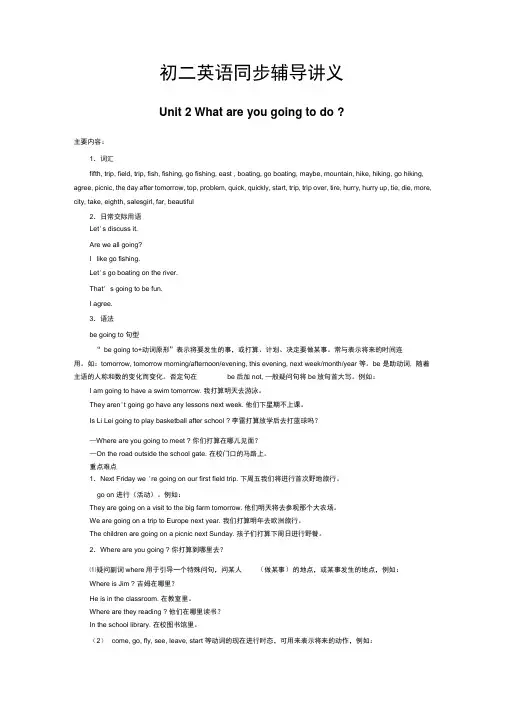
初二英语同步辅导讲义Unit 2 What are you going to do ?主要内容:1.词汇fifth, trip, field, trip, fish, fishing, go fishing, east , boating, go boating, maybe, mountain, hike, hiking, go hiking, agree, picnic, the day after tomorrow, top, problem, quick, quickly, start, trip, trip over, tire, hurry, hurry up, tie, die, more, city, take, eighth, salesgirl, far, beautiful2.日常交际用语Let's discuss it.Are we all going?I like go fishing.Let's go boating on the river.That' s going to be fun.I agree.3.语法be going to 句型“ be going to+动词原形”表示将要发生的事,或打算、计划、决定要做某事。
常与表示将来的时间连用。
如:tomorrow, tomorrow morning/afternoon/evening, this evening, next week/month/year 等。
be 是助动词, 随着主语的人称和数的变化而变化。
否定句在be后加not, —般疑问句将be放句首大写。
例如:I am going to have a swim tomorrow. 我打算明天去游泳。
They aren't going go have any lessons next week. 他们下星期不上课。
Is Li Lei going to play basketball after school ? 李雷打算放学后去打蓝球吗?—Where are you going to meet ? 你们打算在哪儿见面?—On the road outside the school gate. 在校门口的马路上。
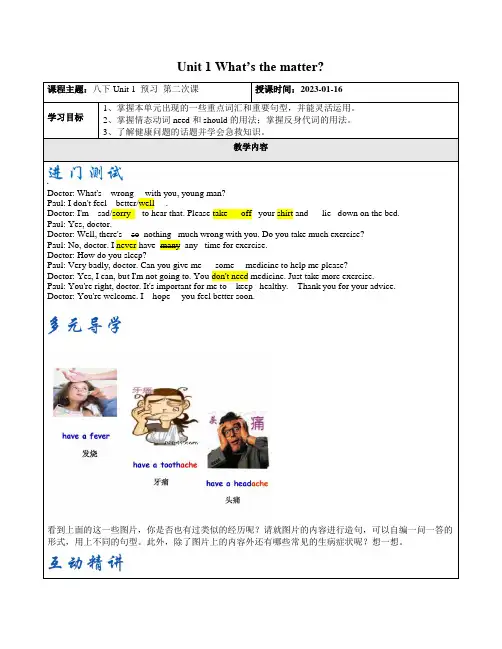
Unit 1 What’s the matter?Doctor: What's__wrong__ with you, young man?Paul: I don't feel__better/well__ .Doctor: I'm__sad/sorry__ to hear that. Please take___off_ your shirt and___lie_ down on the bed.Paul: Yes, doctor.Doctor: Well, there's__so_nothing_ much wrong with you. Do you take much exercise?Paul: No, doctor. I never have_many_any_ time for exercise.Doctor: How do you sleep?Paul: Very badly, doctor. Can you give me___some__ medicine to help me please?Doctor: Yes, I can, but I'm not going to. You don't need medicine. Just take more exercise.Paul: You're right, doctor. It's important for me to__keep_ healthy. Thank you for your advice.Doctor: You're welcome. I__hope__ you feel better soon.看到上面的这一些图片,你是否也有过类似的经历呢?请就图片的内容进行造句,可以自编一问一答的形式,用上不同的句型。
此外,除了图片上的内容外还有哪些常见的生病症状呢?想一想。
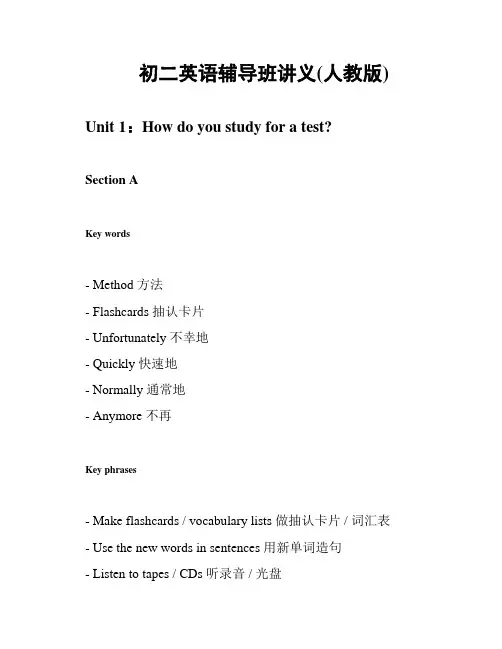
初二英语辅导班讲义(人教版) Unit 1:How do you study for a test?Section AKey words- Method 方法- Flashcards 抽认卡片- Unfortunately 不幸地- Quickly 快速地- Normally 通常地- Anymore 不再Key phrases- Make flashcards / vocabulary lists 做抽认卡片 / 词汇表- Use the new words in sentences 用新单词造句- Listen to tapes / CDs 听录音 / 光盘- Work with a group 和组员一起工作- Ask the teacher for help 向老师求助- Prepare for tests 准备测试Section BKey words- Rehearsal 排练- Neither ... nor 既不 ... 也不- Tutors 家教- Whether ... or 不管 ... 还是Key phrases- Know how to do sth. 知道如何做某事- Get ready for sth. 准备某事- Practice doing sth. 练做某事- Neither ... nor 既不 ... 也不- Whether ... or 不管 ... 还是- At the last minute 在最后关头Unit 2: I used to be afraid of the dark Section AKey words- Used to 曾经- Nightmares 噩梦- Afraid 害怕的- Suggest 建议Key phrases- Be afraid of / scared of 害怕- Used to be / do 曾经是 / 做- Dream about 梦见- Get over 克服- Suggest doing sth. 建议做某事Section BKey words- Surfing 上网冲浪- Blog 博客- Begin to / start to 开始做某事- Chatting 聊天- Impossible 不可能的- Information 信息Key phrases- Go online 上网- Begin to / start to 开始做某事- Take a break 休息片刻- Chat with sb. 与某人聊天- Look up information 查找资料- Learn about 研究关于...的知识- Think about / of 思考Unit 3: Teenagers should be allowed to choose their own clothes.Section AKey words- Appropriate 适当的- Allow 允许- Match 匹配- Decide 决定Key phrases- Be allowed to do sth. 被允许做某事- Dress oneself 穿衣服- Match sth. with sth. 把某物和某物搭配- Make one's own decisions 做出自己的决定Section BKey words- Button 扣子- Collar 衣领- Skill 技巧- Experience 经验- Embarrassed 尴尬的Key phrases- Put on 穿上- Be skilled in doing sth. 熟练掌握做某事的技巧- Have experience of / in doing sth. 有做某事的经验- Be embarrassed 尴尬Unit 4: What would you do?Section AKey words- Annoying 讨厌的- Situation 情况- Honest 诚实的- Agree 同意- Confess 坦白Key phrases- Get in trouble 惹麻烦- Talk to sb. about sth. 与某人谈论某事- Be honest about 对某事诚实- Agree with 同意- Confess to sth. 坦白做某事Section BKey words- Nevertheless 然而- Press 压- Suggest 建议- Professionally 专业地Key phrases- Think about 思考- Be pressed for time 时间很紧张- Suggest doing sth. 建议做某事- Do sth. professionally 用专业的方式做某事- Have faith in sb. 对某人有信心。
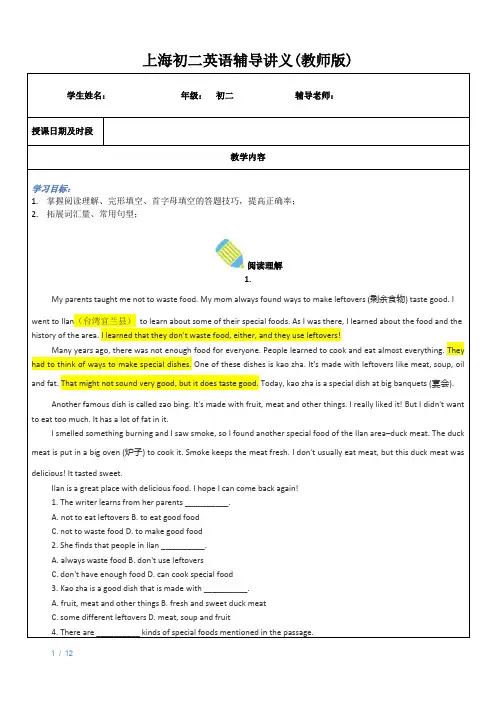
上海初二英语辅导讲义(教师版)学习目标:1.掌握阅读理解、完形填空、首字母填空的答题技巧,提高正确率;2.拓展词汇量、常用句型;阅读理解1.My parents taught me not to waste food. My mom always found ways to make leftovers (剩余食物) taste good. Iwent to Ilan(台湾宜兰县)to learn about some of their special foods. As I was there, I learned about the food and the history of the area. I learned that they don't waste food, either, and they use leftovers!Many years ago, there was not enough food for everyone. People learned to cook and eat almost everything. They had to think of ways to make special dishes. One of these dishes is kao zha. It's made with leftovers like meat, soup, oil and fat. That might not sound very good, but it does taste good. Today, kao zha is a special dish at big banquets (宴会).Another famous dish is called zao bing. It's made with fruit, meat and other things. I really liked it! But I didn't want to eat too much. It has a lot of fat in it.I smelled something b urning and I saw smoke, so I found another special food of the Ilan area─duck meat. The duck meat is put in a big oven (炉子) to cook it. Smoke keeps the meat fresh. I don't usually eat meat, but this duck meat wasdelicious! It tasted sweet.Ilan is a great place with delicious food. I hope I can come back again!1. The writer learns from her parents __________.A. not to eat leftoversB. to eat good foodC. not to waste foodD. to make good food2. She finds that people in Ilan __________.A. always waste foodB. don't use leftoversC. don't have enough foodD. can cook special food3. Kao zha is a good dish that is made with __________.A. fruit, meat and other thingsB. fresh and sweet duck meatC. some different leftoversD. meat, soup and fruit4. There are __________ kinds of special foods mentioned in the passage.A. twoB. threeC. fourD. five5. From the p assage, we know that __________.A. there was not enough food in Ilan long agoB. leftovers can't be used to cook delicious foodC. zao bing is a famous dish without any fat in itD. the writer is interested in very big banquets解析:1、C 这是一道细节理解题。
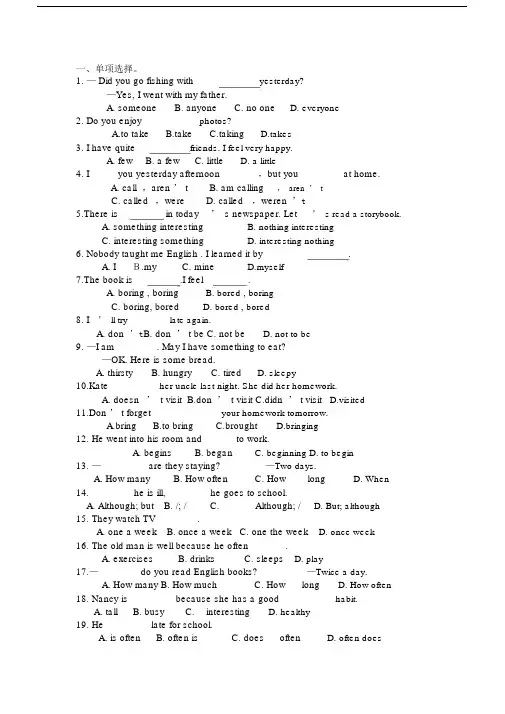
一、单项选择。
1. — Did you go fishing with yesterday?—Yes, I went with my father.A. someoneB. anyoneC. no oneD. everyone2. Do you enjoy ________photos?A.to takeB.takeC.takingD.takes3. I have quite friends. I feel very happy.A. fewB. a fewC. littleD. a little4. I _____you yesterday afternoon,but you ________at home.A. call ,aren ’ tB. am calling,aren’tC. called,wereD. called,weren’t5.There is in today’ s newspaper. Let’ s read a storybook.A. something interestingB. nothing interestingC. interesting somethingD. interesting nothing6. Nobody taught me English . I learned it by.A. IB.my C. mine D.myself7.The book is.I feel.A. boring , boringB. bored , boringC. boring, boredD. bored , bored8. I’ ll try________ late again.A. don ’tB. don ’ t beC. not beD. not to be9. —I am________. May I have something to eat?—OK. Here is some bread.A. thirstyB. hungryC. tiredD. sleepy10.Kate________ her uncle last night. She did her homework.A. doesn’ t visitB.don’ t visitC.didn ’ t visitD.visited11.Don ’ t forget ________your homework tomorrow.A.bringB.to bringC.broughtD.bringing12. He went into his room and ______to work.A. beginsB. beganC. beginningD. to begin13. — ________ are they staying?—Two days.A. How manyB. How oftenC. How longD. When14.________ he is ill, ________he goes to school.A. Although; butB. /; /C.Although; /D. But; although15. They watch TV________.A. one a weekB. once a weekC. one the weekD. once week16. The old man is well because he often_______.A. exercisesB. drinksC. sleepsD. play17.—________do you read English books?—Twice a day.A. How manyB. How muchC. How longD. How often18. Nancy is ________ because she has a good habit.A. tallB. busyC. interestingD. healthy19. He ________ late for school.A. is oftenB. often isC. does oftenD. often does20.Tom, your father is waiting ________ you at the school gate.A.forB.atC.withD.as21. —Where ____ you ____ lunch?—At home. There was no school lunch.A. did, haveB. are, havingC. will, haveD. do , have22. —How was your vacation? — ______ . I liked it very much.A. Very badB. WonderfulC. I ’ m fineD. Have a good time23. —Steven, can you help me buy some meat? — __ ,I like shopping.A. That ’ s rightB. SorryC. Of courseD. You ’ re welcome24.— What are you going to give your mother for her birthday?— I ’m not sure. But I ’ llbuy her ______ . A.something special B. anything special C. specialsomething D. special anything25.---Do you have ____to say for yourself?---No, I have ______to say.A. something; everythingB. nothing; somethingC. everything; anythingD. anything; nothing26. There is _____ wrong with his eyes. He can ’ t see things clearly.A. somethingB. anythingC. nothingD. everything27. ---______ was your vacation? --- It _____ exciting.A. How; wereB.What; wereC. How; wasD. What; was28 . I don ’ t want to go to the museum, it ’ s too .A. relaxingB. boringC. boredD. beautiful29 . I didn ’ t go to the mountains ______the bad weather.A. soB. because ofC. becauseD. but30. Do you enjoy ______ photos?A. to takeB. takeC. takingD. takes31. Yesterday afternoon, we ______to the park.A. wentB. goC. goesD. goed32 . It ’ s cold, so we decided ______at home.A. stayB. to stayC. stayingD. stayed33 . She didn ’ t ______ me about it.A. toldB. tellC. tellingD. tells34. Although he is very old, ______ he works very hard.A. soB. butC. andD. /35. Xiao Zhang ________ watches TV. He likes going online.A. hard everB. hardly everC. does n’ t hard everD. doesn ’ t hardly ever36.Here ____ the results _____ the students activity survey.A. is; withB. are; ofC. is; ofD. are; with 37. My parents are ingood _______. They are pretty _______.A. health; healthB. healthy; healthyC. health; healthyD. healthy; health38 . It’ s good _______ your health ________.A. for; to drink milkB. for; drink milkC. of; drink milkD. of; to drink milk39. I usually go to the movies ________ a month.A. twiceB. twice timeC. two timesD. twice times40. _____do they play football? —Sometimes.A. How soonB. How muchC. How manyD. How often41. His mother wants him _____ at home today.A. stays C. stayed C. to stay D. staying42. My grandfather _______ ten years ago.A. deadB. dieC. deathD. died43. Eighty percent of the teachers _ women teachers in our school. A. is B. are C. be D. was二、完形填空。
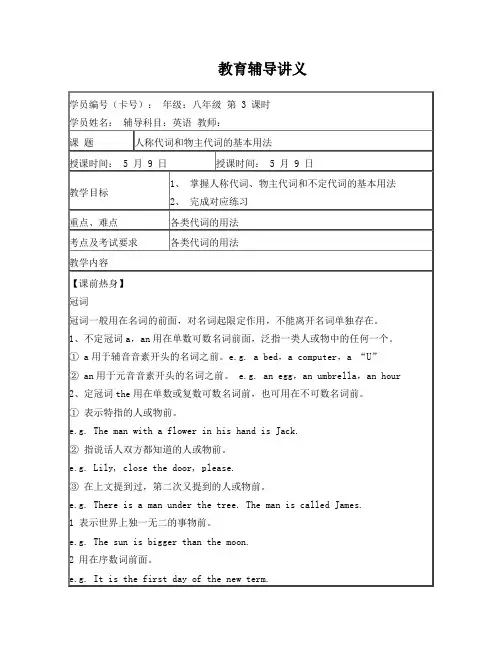
教育辅导讲义
注:若把责任担,第一人称最当先,(即若做错事时,把第一人称放在最前面.) She and I have been to Beijing.
Who broke the window? I and Mike.
1、人称代词:表示“我、你、他、她、它、我们、你们、他们”的词。
我你他她它我们你们他们
主格I you he she it we you they
宾格me you him her it us you them
①主格一般用在句子开头做主语,通常用在动词前。
e.g. I am a student. They are cleaning the classroom.
②宾格可以用来表示动作行为的对象,一般用在动词和介词后面。
e.g. Ask her, please. Listen to me carefully.
2、物主代词:表示所有关系的代词叫物主代词。
一般看后面有没有名词,如有,就用形容词性物主代词;如无,就用名词性物主代词。
家长签字: ___________ 思而优教育教务处。
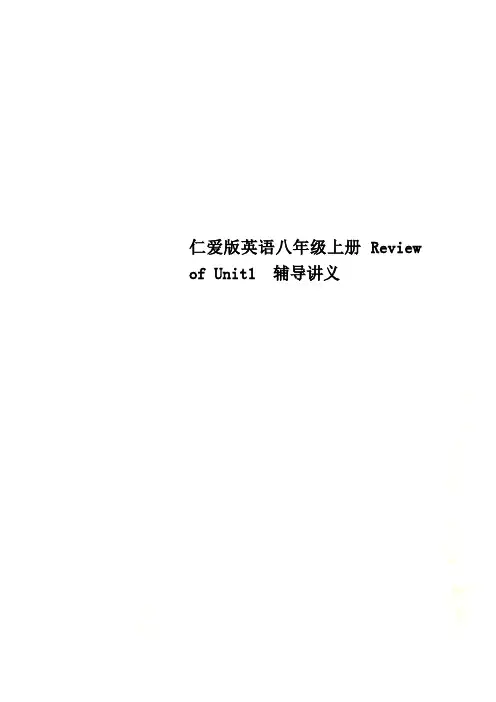
仁爱版英语八年级上册 Review of Unit1 辅导讲义学科教师辅导讲义组长签字:学员编号:年级:八年级课时数:学员姓名:辅导科目:英语学科教师:授课日REVIEW OF U1期及时段教学目标掌握重点单词和重点句型重点难点重点句型的掌握教学内容铃)响symbol /ˈsɪmb(ə)l/ n.象征,标志stand /stænd/ 站立,位于,忍受stand /stænd/ f or 代表,象征least /liːst/ n.最少;最少量at /æt/ least 至少,不少于nowadays /ˈnaʊədeɪz/现今,现在compete /kəmˈpiːt/ 竞争,对抗chance /tʃɑːns/ 机会,机遇host v.举办,主办;做主人招待;n.主人;节目主持人beginning /bɪ'gɪnɪŋ/开始,开端Review o f Unit 1really /'rɪəli/ 真正地cup /kʌp/ 杯子another /ə'nʌðə/ 另一事物或人break /breɪk/ 使破,碎,打破(记录)freestyle 自由泳swimmer 游泳者record /ˈrekɔːd/ n.记录,唱片v.记录,记载successful /səkˈsesfʊl/获得成功的male /meɪl/ 男性的,男的Jamaican 牙买加的widely /'waɪdli/ 普遍的regard /rɪ'gɑːd/ 将…认为,把…视为whether /'hweðə/ 是否gold /ɡəʊld/ 金子,金色的medal /ˈmed(ə)l/ 奖章,勋章badly /'bædli/ 差,很able /'eɪbl/ 能够,有能力的。
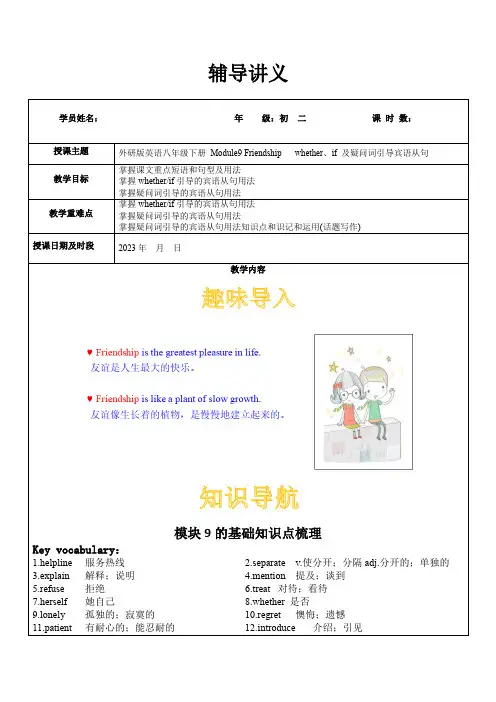
辅导讲义教学内容模块9的基础知识点梳理Key vocabulary:1.helpline 服务热线2.separate v.使分开;分隔adj.分开的;单独的3.explain 解释;说明4.mention 提及;谈到5.refuse 拒绝6.treat 对待;看待7.herself 她自己8.whether 是否9.lonely 孤独的;寂寞的10.regret 懊悔;遗憾11.patient 有耐心的;能忍耐的12.introduce 介绍;引见【用法2】day after day 日复一日地(强调重复性)——Day by day she learnt more about her job.——Day after day he waited for that letter and it never came.whether/if引导的宾语从句如果我们要表达像“他不知道他们周六是否会去植树”或“我记不清以前是否见过他”这样的不确定的概念时,从句就要用 whether 或 if 来引导,不能用 that。
——He does not know whether they will plant trees on Saturday or not. 他不知道他们周六是否会去植树。
——He asks whether/if we will go fishing on Sunday. 他问我们周日是否去钓鱼。
——Tom wants to know whether/if he needs to come early tomorrow. 汤姆想知道他明天是否需要早点来。
注意:if与whether引导宾语从句时都有“是否”的意思,一般情况下可以互换。
但是在动词不定式之前、介词之后或者句尾有or not出现时,一般只能用whether。
——We haven’t decided whethe r to go or not. 我们还没决定是否会去。
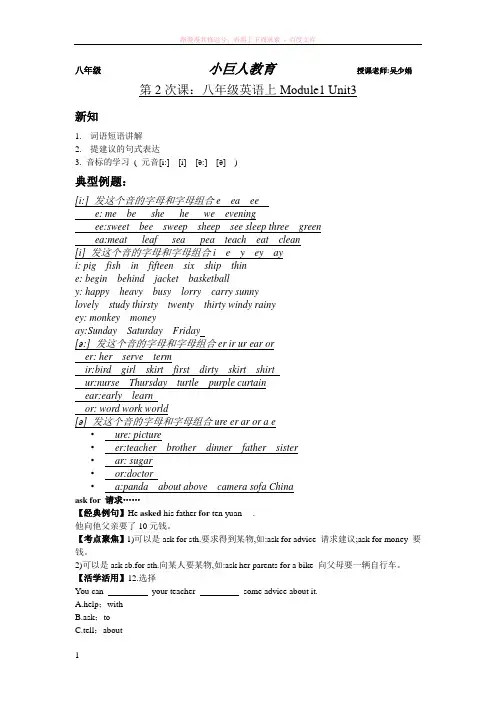
八年级小巨人教育授课老师:吴少娟第2次课:八年级英语上Module1 Unit3新知1.词语短语讲解2.提建议的句式表达3. 音标的学习( 元音[i:] [i] [ә:] [ә] )典型例题:[i:] 发这个音的字母和字母组合e ea eee: me be she he we eveningee:sweet bee sweep sheep see sleep three greenea:meat leaf sea pea teach eat clean[i] 发这个音的字母和字母组合i e y ey ayi: pig fish in fifteen six ship thine: begin behind jacket basketbally: happy heavy busy lorry carry sunnylovely study thirsty twenty thirty windy rainyey: monkey moneyay:Sunday Saturday Friday[ә:] 发这个音的字母和字母组合er ir ur ear orer: her serve termir:bird girl skirt first dirty skirt shirtur:nurse Thursday turtle purple curtainear:early learnor: word work world[ә] 发这个音的字母和字母组合ure er ar or a e•ure: picture•er:teacher brother dinner father sister•ar: sugar•or:doctor•a:panda about above camera sofa Chinaask for 请求……【经典例句】He asked his father for ten yuan.他向他父亲要了10元钱。
人教版八年级英语上册英语辅导讲义一、单项选择。
1. ——Did you go fish ing with yesterday?—Yes, I went with my father.A. some oneB. anyoneC. no oneD. every one2. Do you enjoy _________ photos?A.to takeB.takeC.tak ingD.takes3. I have quite frien ds. I feel very happy.A. fewB. a fewC. littleD. a little4. I ____ you yesterday after noon , but you ________ at home.A. call , aren ' tB. am calling , aren ' tC. called , wereD. called , weren 't5. There is ____ i n today ' s newspaper. Let ' s read a storybook.A. someth ing in teresti ngB. no thi ng in teresti ngC. i nteresti ng somethi ngD. i nteresti ng nothing6. Nobody taught me En glish . I lear ned it by . ___________A. I B .my C. mine D.myself7. The book is .I feel .A. bori ng , bori ngB. bored , bori ngC. bori ng, boredD. bored , bored8. I ' ll t ________ late again.A. don 't. don ' t be C. not be D. not to be9. —I am _______ . May I have someth ing to eat?—OK. Here is some bread.A. thirstyB. hungryC. tiredD. sleepy10. Kate ________ her un cle last ni ght. She did her homework.A. doesn ' t visitB.don ' t visitC.didn ' t visitD.visited11. Don ' t forget_________ your homework tomorrow.A.bri ngB.to bringC.broughtD.bri nging12. He went into his room and _____ to work.A. beg insB. bega nC. beg inningD. to begi n13. —_________ are they stay ing? —Two days.A. How manyB. How ofte nC. How longD. When14. ______ he is ill, _________ h e goes to school.A. Although; butB. /; /C. Although; /D. But; although15. They watch TV _______ .A. one a weekB. once a weekC. one the weekD. once week16. The old man is well because he often _____ .A. exercisesB. drinksC. sleepsD. play17. —_______ do you read En glish books? —Twice a day.A. How manyB. How muchC. How longD. How ofte n18. Nancy is _______ because she has a good habit.A. tallB. busyC. in teresti ngD. healthy19. He _______ late for school.A. is ofte nB. ofte n isC. does ofte nD. ofte n does20. Tom, your father is wait ing ______ you at the school gate.A.forB.atC.withD.as21. —Where __ y ou _____ lun ch?—At home. There was no schoo I lun ch.A. did, haveB. are, hav ingC. will, haveD. do , have 22.How was your vacatio n? — ______ . I liked it very much.A. Very badB. WonderfulC. I ' m fineD. Have a good time23. —Steven, can you help me buy some meat? —_ , I like shopp ing.A. That ' s rightB. SorryC. Of courseD. You ' re welcome24. —What are you going to give your mother for her birthday?—I 'mnot sure. But I ' buy her ___________ .A. someth ing specialB. anything specialC. special somethi ngD. special anything25. ---Do you have ___ to say for yourself?---No, I have _____ to say.A. someth ing; everyth ingB. nothing; someth ingC. everyth ing; any thi ngD. any thi ng; no thi ng26. There is _____ wrong with his eyes. He can ' t see things clearly.A. someth ingB. any thi ngC. nothingD. everyth ing27. --- _____ was your vacati on? ---It _______ e xcit ing.A. How; wereB.What; wereC. How; wasD. What; was28 . I don ' t want to go to the museum, it ' s too _____ .A. relax ingB. bori ngC. boredD. beautiful29 . I didn ' t go to the mountains _________ t he bad weather.A. soB. because ofC. becauseD. but30. Do you enjoy ____ photos?A. to takeB. takeC. taki ngD. takes31. Yesterday after noon, we ______ to the park.A. wentB. goC. goesD. goed32 . It ' s cold, so we decided ______ at home.A. stayB. to stayC. stayi ngD. stayed33 . She didn ' t ______ me about it.A. toldB. tellC. telli ngD. tells34. Although he is very old, _____ he works very hard.A. soB. butC. andD. /35. Xiao Zhang _______ watches TV. He likes going on li ne.A. hard everB. hardly everC. doesn ' t hard everD. doesn ' t hardly ever36. Here ____ the results _____ the stude nts activity survey.A. is; withB. are; ofC. is; ofD. are; with37. My pare nts are in good ______ . They are pretty _______A. health; healthB. healthy; healthyC. health; healthyD. healthy; health38 . It ' s good _________ your health ________ .A. for; to drink milkB. for; drink milkC. of; drink milkD. of; to drink milk39. I usually go to the movies _______ a mon th.A. twiceB. twice timeC. two timesD. twice times40. ____ do they play football? —Sometimes.A. How soonB. How muchC. How manyD. How ofte n41. His mother wants him ____ at home today.A. stays C. stayed C. to stay D. stayi ng42. My gran dfather _____ ten years ago.A. deadB. dieC. deathD. died43. Eighty perce nt of the teachers _ women teachers in our school. A. is B. are C. be D. was、完形填空Food is very importa nt.Every one n eeeds to_ 1__well if he or shewants to have a strong body.Our brains(大脑)also n eed a kind offood.This kind of food is 2_.We_beg in to get kno wledge whe n we arevery youn g.Small childre n are 3 in everyth ing aroundthem.They learn__4_ while(当)they are watch ing andthey are gett ing older,they beg in to _6__storybooks,a nythi ng theylike.Whe n they find 7 ,they like to ask questi ons and _8__to _find out the an swers.What is the best _9__to get knowledge?If welearn by ourselves,we ' ll get the most knowledge.If we' re_10_ getting answers from others and do not ask why,we will neverlearn well.When we study in a right way,we will learn and un dersta ndbetter.1. A.read B.see C.eat2.3.4.5.6.7.8. A.k nowledge A.interest A.anything A.finding A.readB.fruitC.sportB.i nterestedC.i nterestingB.somethi ngC. no thi ngB.looki ngC.liste ningB.learnC.buyA. new someth ingB.somethi ng newC.anyting new A.try B.like C.have9. A.school B.way C.place10. A.often B.always ually三、阅读理解。
学科教师辅导讲义学员编号:年级:八年级课时数: 3学员姓名:辅导科目:英语学科教师:授课类型T同步(八上U1-4复习)授课日期及时段2023年月日教学内容T同步-八上U1-4复习同步知识梳理(大脑放电影~)一.词性转换1.wonder(v.)想知道→(adj.)精彩的;绝妙的2.activity(n.)活动→(adj.)积极的3.full(adj.)忙的;满的→(v.)填满;充满4.yourself(pron.)你自己→(复数)你们自己5.building(n.)建筑物→(v.)建造→过去式built6.wet(adj.)湿的→(比较级)→(最高级)→干的(反义词)7.wait(v.)等待→(n.)服务生→(n.)女服务生8.hunger(n.)饥饿→(adj.)饥饿的9.health(n.)健康→(adj.)健康的→healthily(adv.)健康地10.loud(adj.)大声的→(adv.)大声地;喧闹地11.quiet(adj.)安静的→(adv.)轻声地;安静地12.clear(adj.)清楚的→(adv.)清楚地pete(v.)→(n.)比赛;竞赛;竞争→(n.)参赛者;竞争者14.win(v.)获胜→过去式→(n.)获胜者15.care(v.)关心→(adj.)认真的→(adj.)粗心的→(adv.)认真地→(adv.)粗心地16.serious(adj.)严重的;严肃的→(adv.)严重地;严肃地;认真地17.break(v.)打破→过去式→(adj.)坏的;破碎的fortable(adj.)舒服的→(adv.)舒服地19.reporter(n.)记者→(v.)报道四者都意为“到达”,但也有区别。
1. arrive+in+大地方(国家、城市等)。
2. arrive+at+小地方(村庄、车站、码头等)。
3. get to+地点名词。
4. reach+地点名词。
注:当reach, arrive, get后接地点副词here, there, home等时,不能接任何介词。
Unit 4 Why don’t you talk to your parents ?讲义一、Section A1. allow[əˈlaʊ] v.允许,准许My parents don’t allow me to go out at night .我父母不允许我晚上出去。
2. wrong[rɔŋ] adj.错误的,有毛病的There's something wrong with my bike.我的自行车出毛病了。
3. guess[ɡes] v.猜测,估计I guess you are right .我猜你是对的。
4. deal[di:l] n.协议;交易a big deal一件重要的事It’s a big deal.这是一件重要的事。
5. relation [rɪˈleɪʃn] n.关系;联系;交往Relations between them have improved.他们之间的关系有所改善。
municate[kəˈmju:nikeit] v.沟通;交流Why don’t you communicate with your mother ?你为什么不和你妈妈沟通一下?7. communication[kəˌmju:nɪˈkeɪʃn] n.交流;沟通It’s a kind of communication .这是一种交流。
8. argue[ˈɑ:ɡju:] v.争论;争吵Don't argue with me.别和我争辩。
9. elder['eldə(r)] adj.年级较长的My elder brother is very tall.我哥哥很高。
10. instead[ɪnˈsted] adv.代替;反而;却He will be on duty instead of me tomorrow.明天是他值日而不是我。
11. whatever[wɒtˈevər] pron.任何;每一You can buy whatever you like .你想买什么就买什么。
辅导讲义教学内容When it’s on, it means we’re on air.当它(红灯)亮时,表示我们正在广播模块10的基础知识点梳理Key vocabulary:1.director [də'rektə(r)]导演;主管;经理2.show [ʃəʊ]引领;带领3.around [ə'raʊnd]到处;向各处4.show sb. around带某人参观;给某人做向导5.on air(广播或电视)播出6.avoid [ə'vɔɪd]避免;防止7.background [ˈbækgraʊnd]背景;后景8.national ['næʃnəl]国家的;国内的9.international[ˌɪntə'næʃnəl]国际的;世界的10.presenter [prɪˈzentə(r)]主持人11.interview ['ɪntəvju:]n.采访;访谈v.采访;访问12.seem [si:m]看来;似乎13.listener [ˈlɪsənə(r)]听众;听者14.in person亲自;本人➢➢➢12.【课文原句】One day I learnt about Internet radio. 有一天我听说了网络电台。
【用法】learn about 听说,了解13.【课文原句】I did this by looking out of the window. 我是根据观察窗外的情况做到的。
【用法1】look out of the window 向窗外看【用法2】by doing sth. 通过做某事一、宾语从句的时态1、主句现在时态,从句时态根据实际情况选择——I can hardly believe we’re in the city centre.(主句和从句都是现在时)真不敢信心我们是在市中心——I’m sure it’ll be fantastic to see the city from the top.(主句现在时,从句将来时)我相信从山顶上看到的城市风景将会是极好的。
学府英语八年级下UNIT5TOPIC3同步讲义重点短语:1.calm down 使平静,镇静2.bored adj. 有苦的,痛苦的boring和bored的区别:bored一般用于人;boring一般用于物1,He bored us all by talking for hours about his new car.这里的bored为bore的过去式,及物动词.关于他的新车,他说了好几小时,把我们烦死了!2,She`s bored with her present job. 她对她现在的工作很无聊.(是人感到无聊)3,His talk is deadly boring.他的话真是让人烦死了! (他的话,为物)3. affect v. 影响4. get along with= get on with 与。
相处5. put on 表演,上映6. especially adv.特别,尤其、7. thought n. 念头,想法8. confident adj. 自信的,有信心的confidence n. 自信心9. decision n. 决定10. think over 仔细思考11. follow the doctor’s advice/suggestions 遵循医生的建议12.take turns to do sth 轮流去做某事13. fall asleep 入睡重点语法:1.make用法小议make是初中英语中出现频率很高的一个动词,它的用法主要有;1.做、制作、制造。
She made a kite for her sister yesterday. 她昨天为她妹妹做了一个风筝。
She makes her own clothes. 她自己做衣服。
This kind of mobile is made in Beijing. 这种手机是北京制造的。
2.铺(床)。
Please make your bed before breakfast. 请在早饭前把床铺好。
2 学员编号:年级:7年级课时数:3 学员姓名:辅导科目:英语学科教师:授课类型T(期中知识点复习上)C(特殊疑问句详解)C(阅读能力提升)授课日期及时段教学内容一、同步知识拓展Part I 1默写重要词组______________________________________________________________________________________ ______________________________________________________________________________________ _____________________________________________________________________________________________________________________________________________________________ ______________________________________________________________________________________ _____________________________________________________________________________________________________________________________________________________________ ______________________________________________________________________________________ _______________________________________________________________________2.Fill in the blanks with the proper words according to the phonetic transcriptions. (看英标写单词)1. The third month of a year is ________ /ma:t.//.2. All________/pla:nts/need water and light.3. He____________ /taid/his horse to a tree by the road.4. Cover the potatoes with some________/3:6/.5.I wrote him ________ /'sevaral/letters but he didn't answer.6.I ________ /nokt/over the glass and spit the water.3.Put the phrases into English.(将下列词组译英文)1. 国庆节________________________2.国定假日____________________3. 还是要谢谢你____________________4. 观光车_____________________精锐教育学科教师辅导讲义87. 接受去宴会的邀请______________________ 8. 走亲戚______________________9. 周末计划___________________________ 10. 观看焰火表演________________11. 开庆祝晚会________________________ 2. 团聚_____________________13. 国庆联欢会_______________________ 14. 一起吃饭__________________15. 你是否愿意干某事?__________________ 16. 用漂亮的灯装饰房间_________ 错的单词订正:Part Ⅱ◆重要知识点回顾A节日的表达:Tree Planting Day 植树节一般以Day 结尾的节日和一些西方传统节日前,都不加冠词。
初二英语个辅讲义Module5 Problems【学习目标】I.Module 5 的重点单词、短语的复习、拓展以及应用;II.复习感叹句【重难点分析】I.复习重点单词、短语be able to+动(原)=can 会/能够……all together 一起win +比赛赢得比赛beat sb./team 打败某人/队agree to do sth. 同意做某事refuse to do sth. 拒绝做某事warn sb. not to do sth.警告某人不要做某事warn sb. about sth./sb.警告某人关于tell sb. about...告诉某人关于……tell sb. the truth 告诉某人真相be proud of 以……为骄傲have chance to do sth. 有机会做某事send sb. away 把某人送走immediately=at once 立刻take off 删除/拿走make sure 确信,一定have a virus 中病毒offer to do sth. 主动要求做某事at least 至少pocket money 零用钱after all 毕竟play the solo 表演独奏be angry with... 生……的气make a mistake 犯错误use … for doing sth.=use … to do sth. 使用……做某事prefer to do sth rather than do sth. 宁可……也不愿意……prefer doing to doing sth. 比起……更喜欢……Exercise:根据中文提示完成句子1.那个小男孩拒绝告诉老师真相。
That little boy ________ ________ _______ ________ ________ ________. 2.我们一起送走了小狗。
We ________ the puppy ________ ________ ________.3.毕竟,他已经同意使用电脑工作。
_______ _______, he has _______ ________ _______ _______ _______ _______.4.那个男孩警告她不要告诉任何人有关他的事。
That boy ________ ________ ________ ________ ________ anyone about him. 5.老师生我们的气了,因为我们犯了错误。
The teacher ________ ________ ________ us because ________ ________ _________ ________.6.比起看电视,我更喜欢打羽毛球。
I ________ ________ badminton ________ ________ TV.【难句分析】1.I see the problem.辨析:problem 与question的区别二者都有“问题”的意思,但用法略有不同。
①.problem 通常指待解决或决定(solve/work out)的问题,尤其较困难的问题。
例如:It is a problem how to make both ends meet. 如何使收支平衡,那是个问题。
②.question通常指因对某事疑惑不解,而提出(ask/answer)问题。
例如:This question is too difficult to answer. 这个问题太难,不能回答。
Exercise:用problem 与question填空1). I have some ___________ about this project.关于这个计划我有一些问题。
2). I can’t work out this maths __________. 我做不出这道数学难题。
2. Rather you than me. 宁愿是你而不是我。
①rather … than / rather than…宁可,而不/与其说……不如说(通常连接两个并列成分) e.g. I am rather bored than tired. 我与其说疲惫不如说厌倦。
He is an artist rather than a philosopher.②would rather do … than do 宁可……不愿e.g. I would rather stay at home than go out. 我宁可待在家里,不想出去。
★知识拓展:rather,fairly的区别①二者都有“相当”的意思,但用法有所不同。
fairly用于表示愉快或满意的场合。
试比较:It is fairly warm today. 今天相当暖和。
(暖和的程度令人满意)It is rather cold this morning. 今晨相当冷。
(令人不满意)②rather可以与too连用,而fairly不能接too。
例如:The book is rather too easy. 这本书过于容易。
Exercise:单项选择1). I ____ live in the countryside than in the city.A. like toB. had betterC. would ratherD. prefer2). They would rather spend time ______ than ______ in the street.A.read;wander;B.reading;wandering;C.reading;to wandering;D.reading;wander.3).He preferred ________ there rather than ________ for the bus here.A.walk,to waitB.walking,waitingC.to walk,to waitD.to walk.wait3.too much/too many/much too辨析①.too much+不可数名词“太多的……” e.g. too much money②.too many+可数名词复数“太多的……” e.g. too many books③.much too+形容词/副词“太……” e.g. much too fastExercise:用too much/too many/much too填空1). They built ____________ buildings last year.2). It is ____________ cold.3). You've given me ____________.【语法复习—感叹句】感叹句记忆口诀感叹句,并不难,what与how应在前。
形容词、副词跟着how,what后面名词连。
名词若是可数单,前带冠词a或an。
主语、谓语放后面,省略它们也常见。
感叹句句型1. What + a / an +adj.+可数名词单数+主语+谓语+其他成分!2. What +adj.+可数名词复数/不可数名词+主语+谓语+其他成分!3. How + adj.+ a / an +名词+主语+谓语+其他成分!4. How + adj./adv.+ 主语+谓语+其他成分!e.g. What a clever boy he is!=How clever a boy he is!What cold weather it is!=How cold the weather is!5.如果句子是纯粹的“主语+谓语+宾语(或其他成分)”结构,那么,变感叹句时,可在句首直接加How。
e.g. How time flies!★感叹句的省略形式为:what a clever boy!专项练习一、选择(真题)1.____ a nice watch it is!(1998山东)A. HowB. WhatC. What aD. How a2. ____ bright girls they are!(1998浙江)A. WhatB. What aC. HowD. How a3. ____ interesting the film is!(1998湖北)A. WhatB. What anC. How4. ____ sunny day! Let’s go out for a walk.(1999江西)A. How aB. HowC. What aD. What5. ____ hard work it is!(1999浙江)A. HowB.WhatC. What aD. What an6. ____ day it is! It’s rainy again. (1999江西)A. How badB. What a badC. How fineD. What a fine二.将下列句子变成感叹句:1. It is quite a nice present.→_____ _____ nice present!2. We have fine weather today.→_____ _____ weather we have today!3. It’s sunny today.→_____ _____ sunny day it is today!4. The children are working hard.→_____ _____ the children are working!5. She played basketball wonderfully.→_____ _____ she played basketball!6. He sings well.→_____ _____ he sings!7. The fish is very lovely.→_____ _____ the fish is!【综合练习】一、单项选择( ) 1. My parents warned me ______too much sweet before going to bed.A. to eatB. to not eatC. not to eat( ) 2. —Have you ever seen Tom and Jerry?—Sure. It is one of cartoons I have ever seen.A. wonderfulB. the most wonderfulC. more wonderful( ) 3. When I got to the school gate, I saw my father with our English teacher.A. talkingB. to talkC. talks( ) 4. Susan _____ quite a lot of money for her new clothes every month though her family is not rich.A. spendsB. costsC. pays( ) 5. 2010·东营Something smells______, you’d better clean your house often.A. goodB. terribleC. terribly( ) 6. 2009·广州—When did your uncle arrive China?A.at; inB. in; inC. in; on( ) 7. —What shall we do this Sunday?—Why _______to West Hill Farm? —Good idea!A. don’t goB. you not goC. not go( ) 8. —Dad, do you like my picture?—______!It’s the nicest one I’ve ever seen!A. What a strong boyB. How carefulC. How wonderful( ) 9. 2009·杭州—I’m sorry. I didn’t do a good job.—That’s OK. You tried your best ______.A. after allB. in allC. first of all( ) 10. —The TV show Home with Kids is so wonderful. You shouldn’t miss it.—If I have time, I ________ it.A. seeB. sawC. will see( ) 11. _________ beautiful the flower is!A. WhatB. What aC. HowD. How a( ) 12. _________ hard the people are working!A. WhatB. What aC. HowD. How a( ) 13. _________ good boy he is!A. WhatB. What aC. HowD. How a( ) 14. _________ funny the little boy is!A. WhatB. What aC. HowD. How a( ) 15. _________ hot the water is!A. WhatB. What aC. HowD. How a二、情景交际. A)根据语境,选择适当的选项完成对话。